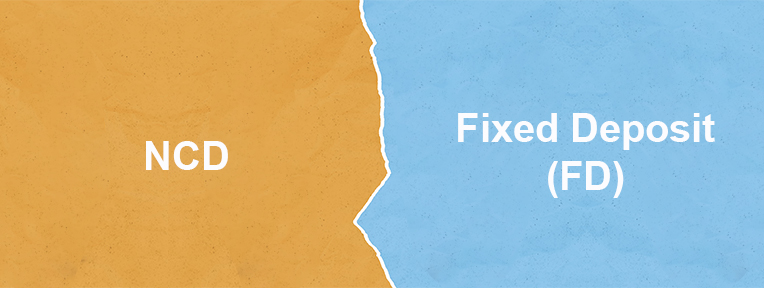
NCD vs Fixed Deposit (FD): Which is Better?
Posted on Wednesday, November 27th, 2024 | By IndusInd Bank
Are you confused between investing in Fixed Deposits (FDs) and Non-Convertible Debentures (NCDs)? If unsure whether to invest in FDs or NCDs, consider factors like the investment time frame, risk appetite level, and desired returns. FDs offer guaranteed returns and safety, while NCDs might provide higher yields but come with higher risk.
Being aware of the key differences between the two can help you make a well-informed decision that aligns with your financial goals. So, let’s dive into the differences and see what works best for you – FD or NCD.
1) Safety and Risk
Fixed deposit accounts are traditionally considered one of the safest financial options, as your capital is not impacted by market changes and remains secure. Since FDs assure your principal amount and offer a fixed return, they are a great option for risk-averse investors.
In contrast, NCDs are debt instruments issued by companies to raise capital. While they might offer higher returns as compared to FDs, they also come with a higher risk as they depend on the company’s financial health. If the company faces financial difficulties, your investment could be at great risk.
2) Interest Rates and Returns
FDs offer an assured and stable return based on the interest rate decided at the booking time. For instance, IndusInd Bank Fixed Deposit Accounts offer competitive interest rates of up to 7.75% p.a. (subject to change; for the latest fixed deposit rates), which are among the best in the market.
Other advantages of this IndusInd Bank Fixed Deposits are:
| Feature | Overview |
| Stress-free instant booking | Book online in three simple steps with Aadhaar and PAN details |
| Auto-renewal and flexible interest payment options | Select from monthly, quarterly, half-yearly, yearly, and maturity payout options |
| Video KYC facility | Complete your KYC instantly online |
You can also use an online FD calculator to estimate the overall interest amount that will be accumulated over the investment period.
NCDs typically offer higher interest rates than FDs to compensate for the higher risk. However, the returns are not assured, and the interest is subject to the issuing company’s performance.
3) Liquidity
FDs have a lock-in period, and premature withdrawals often come with a penalty. However, they are comparatively easy to liquidate if needed.
NCDs are generally listed on stock exchanges, allowing you to sell them before maturity. This offers greater liquidity, but the market value of NCDs can fluctuate, meaning you may sell at a loss.
4) Taxation
The interest earned on FDs is completely taxable as per the income tax slab. The financial institution deducts TDS if the interest earned surpasses a specific limit.
Interest from NCDs is also taxable, but the tax treatment can differ depending on whether the NCDs are listed or unlisted.
5) Flexibility and Tenure
FDs offer a wide range of tenure options, from a few days to several years, endowing you the flexibility to select based on your financial needs.
NCDs generally come with a fixed tenure, often ranging between one and ten years, and might not offer as much flexibility as FDs.
Also Read: What Makes IndusInd Fixed Deposit a Safe Investment Option?
Which is Better: NCD vs FD?
When it is about selecting between FDs and NCDs, there is no one-size-fits-all answer.
FDs are suitable for conservative investors looking for safety and assured returns. For instance, retirees and investors with short-term financial goals may find FDs better suited. If you prefer a stress-free investment with stable returns, an FD, such as an IndusInd Bank Fixed Deposit Account, could be the perfect choice for you.
On the other hand, NCDs are suitable for investors willing to take on higher risk in exchange for potentially higher returns. If you have an excellent understanding of the market and can bear fluctuations in your investment’s value, NCDs may be a better option.
Ending Note
Both FDs and NCDs have their own set of benefits and drawbacks. Your choice must depend on your risk tolerance level, investment time frame, and financial goals. If you are looking for a stable and safe investment, an FD, especially with a reliable bank like IndusInd Bank, can be an excellent choice.
With features like competitive rates, stress-free booking, and flexible interest payment options, the IndusInd Bank Fixed Deposit Account stands out as an appealing choice for conservative investors.
So, are you ready to begin your investment journey? Open your IndusInd Bank FD account today and enjoy a seamless experience!
Disclaimer: The information provided in this article is generic and for informational purposes only. It is not a substitute for specific advice in your circumstances. Hence, you are advised to consult your financial advisor before making any financial decision. IndusInd Bank Limited (IBL) does not influence the views of the author in any way. IBL and the author shall not be responsible for any direct/indirect loss or liability incurred by the reader for making any financial decisions based on the contents and information.



 Offers
Offers Rates
Rates Debit Card Related
Debit Card Related Credit Card Related
Credit Card Related Manage Mandate(s)
Manage Mandate(s) Get Mini Statement
Get Mini Statement
 categories
categories Bloggers
Bloggers Blog collection
Blog collection Press Release
Press Release


